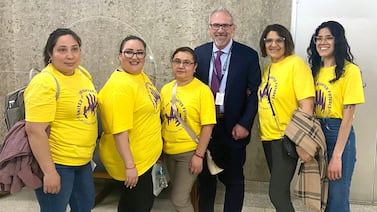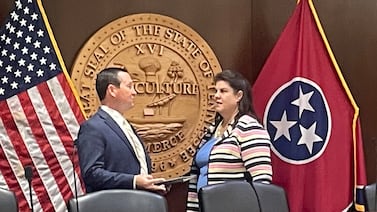More than 30 people told the City Council‘s education committee Wednesday that the school district should reconsider a new admissions policy for its most selective schools, saying it was hastily drawn up without, lacked sufficient public input, and could result in more inequity, not less.
The new policy puts qualified students into a lottery rather than leaving the final admissions decisions to individual school officials. It also gives preference to students from five underrepresented ZIP codes, all of them in North Philadelphia, and uses a machine-scored writing test as a gatekeeper for eligibility.
District officials say it will create more opportunity for underserved students, particularly Black and Latino students who are underrepresented in two of the city’s most coveted schools, Central High and the Julia R. Masterman Laboratory and Demonstration School. Masterman enrolls students in fifth through twelfth grades.
The policy will primarily affect five of the city’s most selective schools: Central, Masterman Carver High School of Engineering and Science, Parkway Center City Middle College, and Academy at Palumbo.
“It is our responsibility to be critical of any and all policies, even those that claim to address equity,” said state Rep. Donna Bullock, whose son is an eighth grader at Carver. “We must be sure the policies achieve the goals they are set for and not set us back.”
Critics were especially concerned with the use of the writing test, which a college professor has said was not designed for the purpose of making high-stakes decisions.
They also said that some of the ZIP codes are in areas that are gentrifying and could end up benefiting students who are already privileged.
Karyn Lynch, the district’s chief of student services, and Sabriya Jubilee, head of its office of diversity, equity and inclusion, offered a robust defense of the new system, while acknowledging that it will continue to evolve.
Lynch brought up a 2017 study by the Pew Charitable Trusts Philadelphia Research Institute that highlighted inequities in the system. That report found that students who are white, Asian American, female and relatively affluent families are more likely to get into selective schools than those who are Black, Latino, male and low-income. It also found that qualified Latino students were less likely to apply to these schools and less likely to attend if they did get admitted.
The report also found that 11% of those who were admitted didn’t have the minimum test scores necessary, while many students who did were not admitted. In this group, there were significant differences based on race, gender and socio-economic circumstances, the Pew study found.
Until now, Lynch said, “we collectively upheld a process we’ve known for years is inequitable and in some cases not even equal.”
Last June, the district “committed to becoming an antiracist, equitable organization by uprooting policies, deconstructing processes and eradicating practices that create systems of privilege and power for one group over another,” said Jubilee. “In 2021 we are still contending with ways to make education accessible and equitable for all students, especially those from historically marginalized communities.”
Bullock acknowledged the complexity of the issue.
“Our conundrum is, what does equity really look like beyond words and eloquent statements,” she said.
She and other parents asked why the policy doesn’t give preference to students who attend Carver’s middle school, saying that until now they have been led to believe that if students maintain good grades, attendance and behavior, they will be admitted into the high school.
Her son, she said, is concerned. When he heard of the new policy, he said, “I can’t stay at my school.”
Lynch said that may have been a practice and expectation communicated by individual principals, but it was never a policy. Students “were always required to apply to the high school, that was not a change,” she said.
Other speakers complained that a student could be declared ineligible for the lottery based on missing the cutoff score by a fraction of a point on the writing test or by being absent one day too many to reach 95% attendance.
Council members made statements, but only David Oh asked questions of Lynch or Jubilee. After the hearing, Oh called on the district to put the new policy on hold and started circulating a letter among other members for support.
The City Council has no control over the district or the school board, which is a separate governmental entity, but it does control the amount of local tax revenue it receives.
Council members passed a resolution calling for the hearing because of how important the issue is to their constituents and how access, or perceived access, to the city’s top schools can determine where families choose to live. Previous efforts to change the system have failed.
Council member Maria Quinones-Sanchez, chair of the education committee, called the rollout of the new policy “bumpy and chaotic,” but was mostly silent on the other criticisms. Committee vice chair Helen Gym said there are “serious issues” with the process, especially the use of the machine-scored writing test. She questioned “any equity definition that relies on the removal of human judgment and reliance on algorithms.”
Like many of the witnesses, several of the council members have or have had children attend top city schools, including Masterman and Central.
Oh said that Superintendent William Hite and Board of Education President Joyce Wilkerson were invited to the meeting, but did not appear.
Parents said, at the very least, there should be an appeals process for students who are otherwise qualified but just miss the cutoff on the writing or attendance requirements. At the Board of Education meeting last week, Lynch said there will not be such appeals, while Hite seemed open to considering them.
Under the old system, principals and admissions teams made the final choice among all students who met minimum standards set by each school for grades, behavior and attendance (and, before the pandemic, standardized test scores).
Lynch said that the district studied admissions patterns and found that decisions were made “more on the school attended than the educational qualifications” of students. Officials chose to give preference to students in ZIP codes “reflecting areas of the city where students had the qualifications to attend but the lowest representation.”
All but one speaker at the hearing spoke against the new system, although almost all said they agreed with the goal of being more equitable and inclusive.
The speaker in favor of the system, parent Stephanie King, is a frequent critic of the district. She agreed that the writing test is “garbage,” but called the new process a step in the direction of opening the magnet schools to higher numbers of deserving children who up to now have been shut out.
“To be blunt: Much of the objection to this policy is privileged and racist,” she told council members.
King said that half the students at Masterman come from private schools or a handful of district schools that have an overrepresentation of white and higher-income students.
“People are saying a lottery is the opposite of merit, but the lottery is for qualified students,” she said.
Many speakers also said that the answer is to improve education at all schools rather than making access to a few top ones such a high-stakes endeavor. Instead of changing how pieces of a very small pie are divvied up, “we need to make the pie bigger,” said Bullock.








